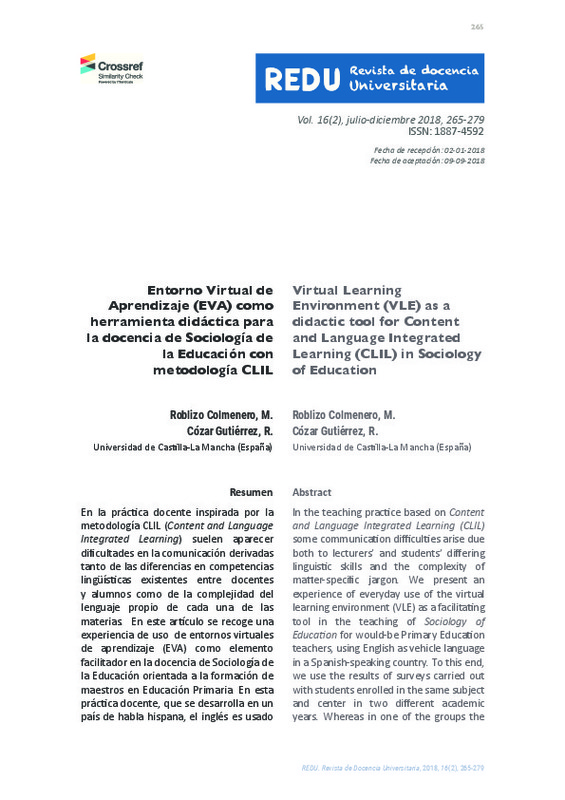JavaScript is disabled for your browser. Some features of this site may not work without it.
Buscar en RiuNet
Listar
Mi cuenta
Estadísticas
Ayuda RiuNet
Admin. UPV
Entorno Virtual de Aprendizaje (EVA) como herramienta didáctica para la docencia de Sociología de la Educación con metodología CLIL
Mostrar el registro sencillo del ítem
Ficheros en el ítem
| dc.contributor.author | Roblizo Colmenero, Manuel
|
es_ES |
| dc.contributor.author | Cózar Gutiérrez, Ramón
|
es_ES |
| dc.date.accessioned | 2019-01-03T07:55:27Z | |
| dc.date.available | 2019-01-03T07:55:27Z | |
| dc.date.issued | 2018-12-28 | |
| dc.identifier.issn | 1887-4592 | |
| dc.identifier.uri | http://hdl.handle.net/10251/114662 | |
| dc.description.abstract | [EN] In the teaching practice based on Content and Language Integrated Learning (CLIL) some communication difficulties arise due both to lecturers’ and students’ differing linguistic skills and the complexity of matter-specific jargon. We present an experience of everyday use of the virtual learning environment (VLE) as a facilitating tool in the teaching of Sociology of Education for would-be Primary Education teachers, using English as vehicle language in a Spanish-speaking country. To this end, we use the results of surveys carried out with students enrolled in the same subject and center in two different academic years. Whereas in one of the groups the teaching was developed through a virtual learning environment (VLE)-based manner, in the second group teaching was only complementarily supported by virtual environments. We notice how students assigned a better value to Content and Language Integrated Learning (CLIL) teaching in the first aforementioned methodology, which allowed them to perceive the use of English as a vehicle language as less problematic -with the potential improvement in its practice that is implicit throughout the process. Thus, we found that virtual learning environment serves as a means for implementation of an active teacher training that efficiently combines the learning of Sociology of Education with the practice of a second language. Additionally, it has been observed that VLE-based methodology facilitates the implementation of cooperative, active and inductive teaching practices when it comes to the use of a language different from the mother tongue. | es_ES |
| dc.description.abstract | [ES] En la práctica docente inspirada por la metodología CLIL (Content and Language Integrated Learning) suelen aparecer dificultades en la comunicación derivadas tanto de las diferencias en competencias lingüísticas existentes entre docentes y alumnos como de la complejidad del lenguaje propio de cada una de las materias. En este artículo recogemos una experiencia de uso de entornos virtuales de aprendizaje (EVA) como elemento facilitador en la docencia de Sociología de la Educación orientada a la formación de maestros en Educación Primaria. En esta práctica docente, que se desarrolla en un país de habla hispana, el inglés es usado como lengua vehicular. Hemos utilizado los datos de encuestas que recogimos de alumnos matriculados en la misma asignatura y centro en dos cursos académicos distintos. Mientras en uno de los grupos de alumnos la docencia se basó en entornos virtuales de aprendizaje, en el segundo de ellos solo se utilizaron de manera complementaria. Hemos observado que los alumnos otorgaban una mejor valoración a la metodología CLIL cuando se desarrollaba con el primero de los enfoques citados, lo que, a su vez, propiciaba una percepción menos problemática del uso del inglés como lengua vehicular –con lo que ello implica a efectos de mejora en todo el proceso formativo-. De esta manera, hemos apreciado que los entornos virtuales de aprendizaje son unos medios eficaces para la implementación de una formación del profesorado activa y de corte inductivo, que conjugue adecuadamente el aprendizaje de Sociología de la Educación con la práctica de un segundo idioma. | es_ES |
| dc.language | Español | es_ES |
| dc.publisher | Universitat Politècnica de València | |
| dc.relation.ispartof | REDU. Revista de Docencia Universitaria | |
| dc.rights | Reconocimiento - No comercial - Sin obra derivada (by-nc-nd) | es_ES |
| dc.subject | Aprendizaje virtual | es_ES |
| dc.subject | Educación integrada | es_ES |
| dc.subject | Técnica didáctica | es_ES |
| dc.subject | Programa de formación del profesorado | es_ES |
| dc.subject | Aprendizaje activo | es_ES |
| dc.subject | Educación superior | es_ES |
| dc.subject | Electronic learning | es_ES |
| dc.subject | Integrated education | es_ES |
| dc.subject | Classroom techniques | es_ES |
| dc.subject | Teacher education curriculum | es_ES |
| dc.subject | Activity learning | es_ES |
| dc.subject | Higher education | es_ES |
| dc.title | Entorno Virtual de Aprendizaje (EVA) como herramienta didáctica para la docencia de Sociología de la Educación con metodología CLIL | es_ES |
| dc.title.alternative | Virtual Learning Environment (VLE) as a didactic tool for Content and Language Integrated Learning (CLIL) in Sociology of Education | es_ES |
| dc.type | Artículo | es_ES |
| dc.date.updated | 2019-01-02T09:29:59Z | |
| dc.identifier.doi | 10.4995/redu.2018.9141 | |
| dc.rights.accessRights | Abierto | es_ES |
| dc.description.bibliographicCitation | Roblizo Colmenero, M.; Cózar Gutiérrez, R. (2018). Entorno Virtual de Aprendizaje (EVA) como herramienta didáctica para la docencia de Sociología de la Educación con metodología CLIL. REDU. Revista de Docencia Universitaria. 16(2):265-279. https://doi.org/10.4995/redu.2018.9141 | es_ES |
| dc.description.accrualMethod | SWORD | es_ES |
| dc.relation.publisherversion | https://doi.org/10.4995/redu.2018.9141 | es_ES |
| dc.description.upvformatpinicio | 265 | es_ES |
| dc.description.upvformatpfin | 279 | es_ES |
| dc.type.version | info:eu-repo/semantics/publishedVersion | es_ES |
| dc.description.volume | 16 | |
| dc.description.issue | 2 |








